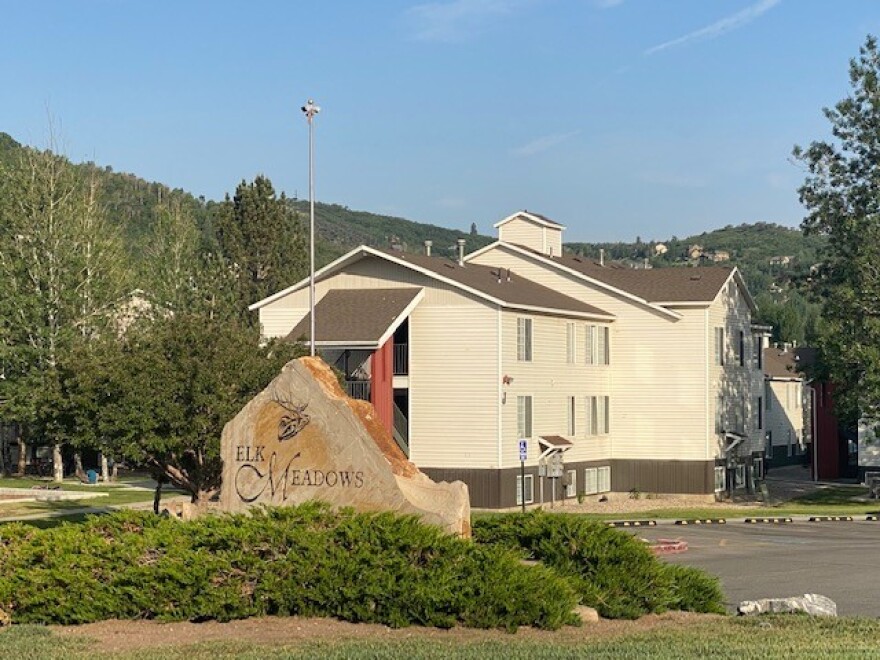KPCW’s report about Elk Meadows, an affordable housing complex near Ecker Hill Middle School that's owned by a multi-billion-dollar company in Seattle, sparked questions about how conditions could be so unlivable there. As previously reported, it's been operating without a business license due to health, safety and fire code violations.
Angela McGuire, assistant director of People’s Legal Aid of Utah, joined health officials inspecting Elk Meadows last year. She called it traumatizing.
“Elk Meadows, it's a very extreme case," she said. "But it's very common in Utah. I just think when I went and I saw with my own eyes, and I dressed up in the hazmat suit, and took pictures of some of the things that I saw. I mean, it was horrific, it was completely unsanitary. But we get calls frequently about these issues all throughout the state.”
Another county inspection to examine repairs and progress at Elk Meadows is set for this month.
The reasons Utah is a tough place to rent are complex, according to elected officials and renters' rights groups. Factors include a white-hot real estate market, a culture that prizes property ownership and a bootstrap mentality, and a state legislature filled with landlords and real estate investors.
“It’s good to have diversity in the legislature, right? You know, we need the perspectives of all, and it does feel like we have a lot of landlords in the legislature; we have far fewer low-income renters. Or even high-income renters," said Marsha Judkins, republican state representative from Provo, who’s been working on tenants’ rights.
Hazardous conditions are one challenge some renters encounter. Judkins said hidden lease fees and terms are also a serious problem for Utah renters, and said transparency will reduce evictions, which can occur when people find out their monthly rent is far higher than what their lease said, and they fall behind.
She wrote a bill requiring landlords to disclose all fees before renters sign leases. Her first attempt to pass it in 2020 failed. She said the version that passed earlier this year became a “good practices” law since noncompliant landlords don’t face consequences. She may seek help from the state consumer protection department to enforce it.
“As we were looking into my bill and we had renters come forward and show their leases, we had leases that were 65, 70 pages long," she said. "How could you possibly go through that? I know there's a lot of really great landlords out there. But those ones that are predatory, holy cow, they ruin people's lives, they ruin families’ lives.”
Judkins and others stressed that that term “predatory” rarely applies to mom and pop operations. It’s larger-scale property owners and management companies that they said tend to fall into that category.
Locally, renters interviewed by KPCW would not speak publicly about their problems with landlords, saying they fear retaliation.
Parkite Dani Lofuedo, a former affordable housing task force member, said that in Summit County, she’s seen landlords renting utility closets as rooms, and filling condos with bunkbeds and charging $500 a month per bed, in violation of occupancy limits.
It’s an owner’s market. Utah’s rental vacancy rate is about 4%, which is considered fully occupied.
Paul Smith, President of the Utah Apartment Association, or UAA, confirmed that month-to-month leases are increasing and enable landlords to raise rents more often. He said average annual rent increases are around 5%, far less than home prices are rising.
He called Judkins’s bill ‘progress,’ and also mentioned resources such as the 211 hotline for housing assistance and the web site rentrelief.utah.gov. If renters aren’t availing themselves of assistance, he said, it’s their own mistake.
Advocates like Cassie James say the system is not that simple.
“Even if you speak English, if you don't know what the law is originally, you don't know what is going on," she said. "You don't know what rights are being waived and what's not. And you didn't even know you had these certain rights. In this type of housing environment when it's so tight, even if you did know what was in it, you pretty much sign it anyway because you don't want to be homeless. You have to take what you can get.”
James is a law student at the University of Utah. She coauthored a report last year on renter rights as part of the law school's Justice Lab.
Fighting predatory practices is challenging for legal assistance groups. Their budgets are small - and their nonprofit status legally prohibits lobbying.
That stands in stark contrast to what occurs inside the state capitol.
State Senator Kirk Cullimore Jr. is a former government affairs chair of the UAA. As a lawmaker Cullimore can lobby and legislate on behalf of landlord interest groups. Landlords are also his business clients. Senator Cullimore works with his father in the Cullimore Law Offices. Their practice writes tenant leases for landlords and handles nearly half of all evictions in Utah.
According to renters and advocates, some Cullimore rental apartment leases are 70 pages long. When tenants are evicted, the Cullimore law office serves as a collection agency.
Senator Cullimore did not respond to KPCW’s request for comment.
Smith said the UAA wants renters to be successful and bends over backwards to help them, but that it won’t ask landlords to provide information in tenants’ native language.
He said tracking languages spoken could be deemed discriminatory. Also, landlords usually prevail in eviction cases, and renters have to pay all court costs. So it costs them less when they lose in court if the documents are already in English.
Non-profit renters’ rights groups believe reforms would benefit business and the economy by reducing downstream costs of evictions such as employee turnover and strain on emergency and other social services.
But they can’t make their case at the Capitol, since nonprofits can’t lobby the legislature.

